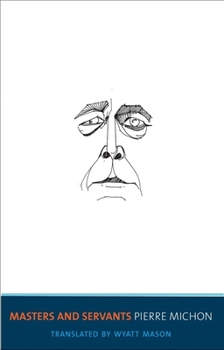Masters and Servants
Select Format
Select Condition 
Book Overview
With his debut into English, 'Masters and Servants' captures the intimate and intricate detail work of five artists' lives through exquisitely crafted fiction. The Arles postmaster Roulin reveals Van... This description may be from another edition of this product.
Format:Paperback
Language:English
ISBN:0300180691
ISBN13:9780300180695
Release Date:October 2013
Publisher:Yale University Press
Length:192 Pages
Weight:0.45 lbs.
Dimensions:0.5" x 5.1" x 7.7"
Customer Reviews
2 ratings
Literature That Matters
Published by Thriftbooks.com User , 24 years ago
Too often, the best books published in any given year are doomed to obscurity. I discovered 'Masters and Servants' in the New York Review of Books in a review by one of America's best critics, Roger Shattuck, author of the famous 'Banquet Years' and 'Forbidden Knowledge'. Shattuck was reviewing a book called 'Degas in New Orleans' published by a big publisher. Shattuck added a review of 'Masters and Servants' into the review, saying that everything that the Degas book tried to be and failed at was everything that 'Masters and Servants' was. Guess what? Shattuck is right. 'Masters and Servants', five stories about painters, is one of the finest pieces of fiction published in America in the 90's. So what are the virtues of this brave book? Great writing, writing that 100 years from now will be around, if there's anything like literary justice. Michon, a Frenchman regarded by intelligent critics as the finest living French author, has published a variety of books in France, most of which are novella-length accounts of lives. 'Masters and Servants' looks and five famous painters-Vincent van Gogh, Goya, Watteau, Piero della Francesca and Claude-via the prism of other people. In the van Gogh story, that person is a postman whom van Gogh painted, Joseph Roulin, a bearded fellow who worked for the mail service in Arles when van Gogh lived there in the late 1890's. There has lately been a trend towards 'faction,' that odd blend of fact and fiction that drives big books like Oates 'Blonde'. Usually an ungainly form that has neither the rigor of history or the whimsy of fiction, 'faction' could not be farther from what Michon is doing. His 'lives' aren't wide-eyed glimpses through history's keyhole at the private lives of famous people. Rather, he uses the barest bits of biography, a single line from Vasari, a famous portrait, as the equivalent of a chalk outline at a crime scene: suggestive but incomplete. That admission of incompletion is the purgatory that Michon fills with his paradisiacal art. And it should be said that Michon isn't an 'easy' author. He rewards the effort his writing requires. But just as when we switch from reading Dickens to Joyce we have to adjust our expectations or else be frustrated, we must adjust when reading Michon. I can't recommend the Michon enough, nor sufficiently praise his translator, Wyatt Mason, for the quality of his work. Too often, translators use the work of foreign authors as a springboard for inventions that bear little resemblance to the originals. Mr. Mason's work is accurate and felicitous, capturing the rhythms and the sonority of the original-a great feat. Finally, not that such things matter, the little book is also beautifully designed, including a series of elegant illustrations by Mr. Mason that seem to indicate he possesses other gifts. I urge you to read this book, and to pass it on to people who know that literature matters.
"What makes an artist destiny?", by a master French writer.
Published by Thriftbooks.com User , 26 years ago
I'm glad to know that one of the greatest living French prose writer is now available in English transalation. His stories on art and artists are splendid examples of his central concern: to catch and describe these moments when an individual life either becomes a destiny, or, on the contrary, is denied its destiny, is robbed of its destiny. For instance: How a seemingly ordinary man (Goya) discovers that he is in fact different from his fellow painters? How, on the contrary, an Italian painter, maybe a genius, ends up with two lines in Vasari? At the time of his death, what remains of Watteau's life, of his work? The style is without any doubt one of the most original, personal, and powerful, of this century in French litterature. Michon is not a very prolific writer. I hope his other books (in particular his masterpiece, in French: Vies Minuscules) will soon be translated in English.





